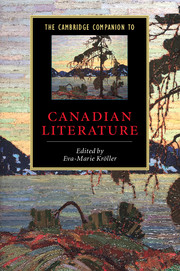Book contents
- Frontmatter
- Introduction
- 1 Aboriginal writing
- 2 Francophone writing
- 3 Exploration and travel
- 4 Nature-writing
- 5 Drama
- 6 Poetry
- 7 Fiction
- 8 Short fiction
- 9 Writing by women
- 10 Life writing
- 11 Regionalism and urbanism
- 12 Canadian literary criticism and the idea of a national literature
- Further reading
- Index
- Series List
7 - Fiction
Published online by Cambridge University Press: 28 May 2006
- Frontmatter
- Introduction
- 1 Aboriginal writing
- 2 Francophone writing
- 3 Exploration and travel
- 4 Nature-writing
- 5 Drama
- 6 Poetry
- 7 Fiction
- 8 Short fiction
- 9 Writing by women
- 10 Life writing
- 11 Regionalism and urbanism
- 12 Canadian literary criticism and the idea of a national literature
- Further reading
- Index
- Series List
Summary
Old World aesthetic codes in New World space
A loosely chronological overview of Canadian literary production reveals a pattern of development that is a constant in national literatures everywhere, albeit more visible in postcolonial societies, namely an initial period of imitation or emulation of metropolitan norms, then a configuration or shift towards assimilation, and finally - in a desire to forge a distinctive national culture - a reconfiguration or revaluation of that which had been considered marginal. Writers in Canada, like those in other settler societies such as Australia, New Zealand, or the United States, have had to raise questions about authenticity, namely the suitability of employing inherited or imported literary and artistic forms for a new environment and experience. Grounded in the socioeconomic, geopolitical space of eighteenth- and early nineteenth-century imperial relations, the earliest prose texts, generated by explorers, travelers, and settlers, were products of a British empire in economic and political expansion, manifest in the huge tides of emigration to Australia and then to British North America that occurred between 1805 and 1835.
- Type
- Chapter
- Information
- The Cambridge Companion to Canadian Literature , pp. 155 - 176Publisher: Cambridge University PressPrint publication year: 2004
- 4
- Cited by



